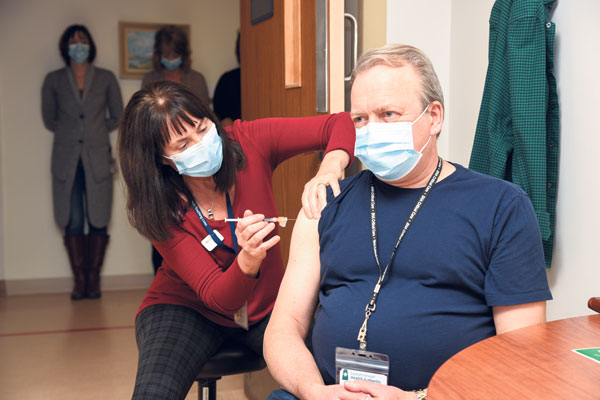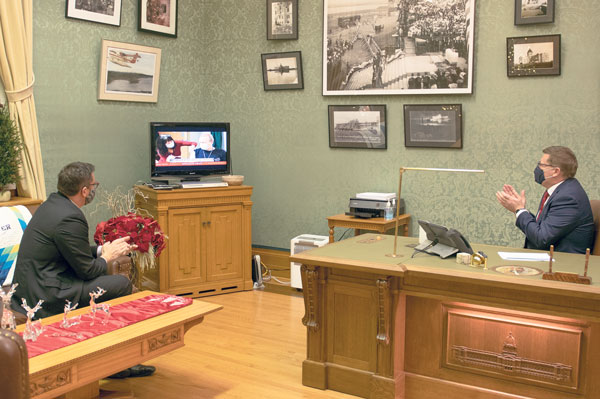
Dr. Jeffrey Betcher has probably never been injected with a vaccine to applause before.
That changed Tuesday, as Betcher became the first person in Saskatchewan to receive a COVID-19 vaccine.
Betcher is a critical care lead, and joined emergency room nurse Leah Sawatsky as the first two residents to receive Pfizer’s COVID-19 vaccine, which arrived in the province just five hours earlier.
The event was captured live and broadcast on major networks. As the needle entered Betcher’s right arm, the small group of health care professionals gathered for the first doses broke into applause.
“This is one step closer to seeing this through to the end. I feel so good about this,” Betcher said as he was vaccinated.
“If you’re unsure, I think it’s really important that you consider getting it done. It protects not only yourself but those around you.”
Betcher described the vaccine as another layer of protection for himself, his staff and his patients as he cares for and looks after them.
Sawatsky said she was “glad” to get the vaccine to keep herself, her friends and family and patients safe.
‘We’re seeing people whose quality of life is being taken away every day,” Sawatsky said.
“Trust the science. It’s good for us, and get the vaccine.”
The initial batch of vaccines, good for about 1,950 people, was delivered Tuesday. Saskatchewan is piloting its vaccination process with employees at Regina General Hospital who are directly providing care to COVID-19 patients.

“We just watched Dr. Jeffrey Betcher and Registered Nurse Leah Sawatsky receive the first two COVID-19 vaccine shots in Saskatchewan,” Premier Scott Moe Tweeted late Tuesday.
“This is not the end of the pandemic. But it is the beginning of the end.”
More doses are expected to arrive early next year. Saskatchewan plans to focus on health care workers, elderly residents in care seniors over the age of 80 and residents in rural and remote northern communities in its first phase of vaccinations.
Saskatchewan is expecting to have 202,052 doses shipped within the first quarter of 2021 from Pfizer. The vaccine requires two doses taken within 21 days to be effective and works in about 94.5 per cent of patients.
Saskatchewan expects to receive 10,725 doses of Pfizer’s vaccine weekly. It is difficult to distribute logistically, as it requires storage at temperatures of – 70 C.
Phase two of the vaccination plan is expected to begin in April and will continue priority population immunization while providing widespread vaccine access to immunize the general population. Distribution in the second phase will occur throughout the province at public health clinics and other vaccination delivery sites, such as pharmacies and doctor’s offices, depending on vaccine availability. Phase two will begin sooner if the province’s vaccine allocation allows.
Seven more COVID-19 deaths Tuesday, including patient in their 20s
Seven more residents, including a patient in their 20s from the north west, have died after a COVID-19 diagnosis, the province said Tuesday.
Five of the deaths were in the 80-plus age group, and one central west resident who died was in their 50s.
The seven deaths bring Saskatchewan’s total to 98. There were also 194 new cases and 363 recoveries reported in Tuesday’s update. The seven-day average of daily new cases is 263, or 21.7 per 100,000 population. The province has 4,204 active cases of COVID-19.
The North Central Zone, which includes Prince Albert, reported 21 new cases Tuesday. Seventeen of those were in Prince Albert, which is now reporting 321 active cases of COVID-19.
Saskatchewan reported 2,438 COVID-19 tests yesterday.
Moderna vaccine coming to Canada this month
The federal government announced on Tuesday that the other commercially-available vaccine, produced by Moderna, will be delivered to Canada this month. In a statement, the federal government announced that it had secured 168,000 doses of the Moderna COVID-19 vaccine.
Those doses are part of the guaranteed 40 million, and up to 56 million, Canada has secured through its agreement with Moderna.
The doses are enough for 84,000 people — like Pfizer’s vaccine, Moderna uses mRNA technology and requires two doses.
The vaccine is still subject to Health Canada approval.
Once the approval is given, Moderna would be able to ship to Canada within 48 hours. The Moderna vaccine requires warmer storage than the Pfizer vaccine, at around – 20 C. It can be stored in a typical commercial freezer and can be used to roll out vaccinations in more remote areas.
The federal government said, in a press release, that the 168,000 doses “will support the first delivery of vaccines to Canada’s north.”
The federal government said it has six standing offers for a weekly delivery of dry ice to help store and transport COVID-19 vaccines.
It’s unclear how many doses will head to Saskatchewan, though an update is expected this week.
Moe said Tuesday that the Moderna doses will allow early vaccinations in Saskatchewan to move even more quickly than anticipated.
Millions of doses of other vaccine candidates, developed by other companies, are also promised to Canada as they are produced, studied and approved.
Moderna’s latest data was made public Tuesday morning ahead of a US Federal Drug Agency review Thursday.
According to Dr. Katelyn Jetelina, an epidemiologist who has gained a social media following after being asked by the dean at the University of Texas to publicly share daily data-driven COVID-19 updates, the data is similar to that reported by Pfizer.
The data included a total of 30,350 participants over the age of 18. The vaccine was shown to be 94.1 per cent effective overall and 80 per cent effective after the first dose. The vaccine also reportedly prevents asymptomatic infections after the first dose.
The most common adverse reactions (i.e. side effects) were injection site pain (91.6 per cent), fatigue (68.5 per cent) headache (63 per cent), muscle pain (59.6 per cent), joint pain (44.8 per cent) and chills (43.4 per cent). Of those, 0.2 to 9.7 per cent were reported as severe, with severe adverse reactions more frequent after the second dose.
- With Leader-Post files from Arthur White-Crummey

